Accident Cars for Sale in USA – Buyer’s Guide
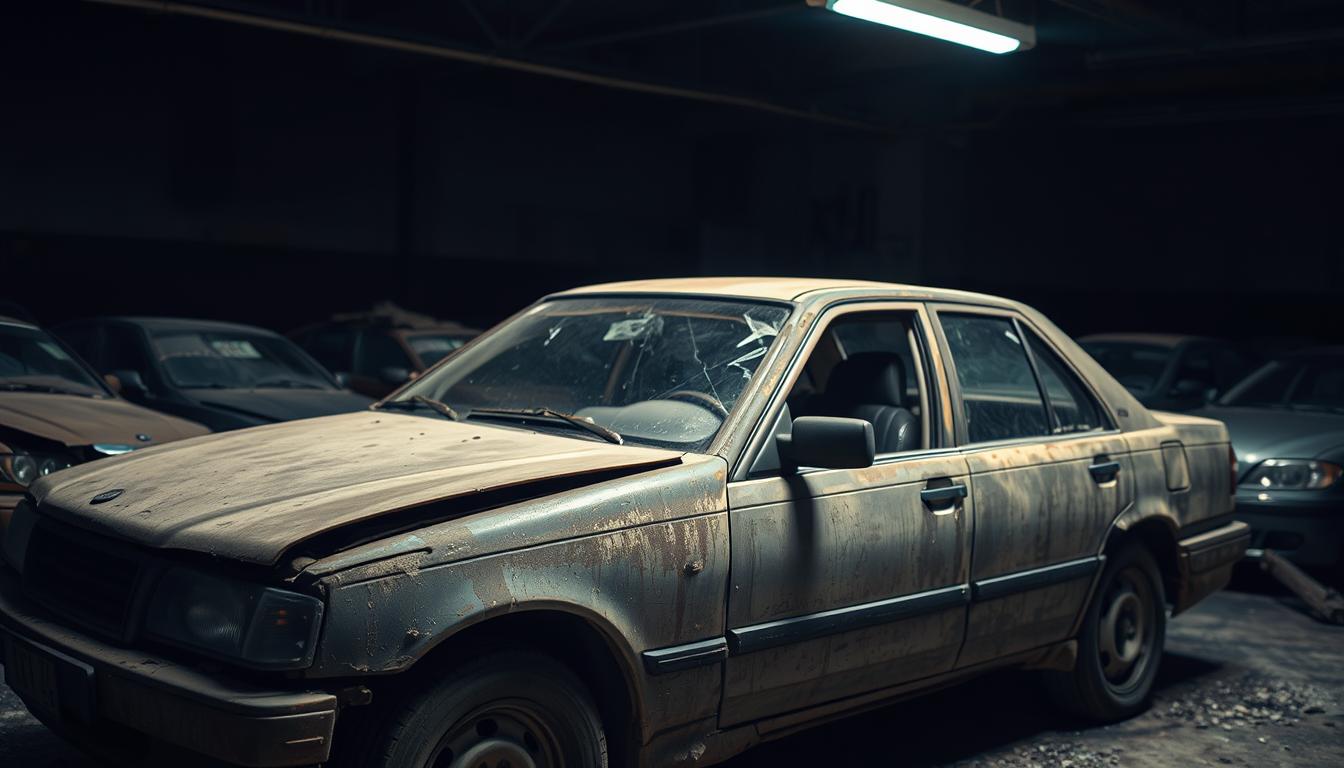
Are you looking for a cost-effective way to purchase your next vehicle? You might be surprised to learn that buying a damaged car can be a savvy investment opportunity, with potential savings of thousands of dollars.
With the right knowledge, you can navigate the process of bidding on accident vehicles and secure a great deal. It’s essential to understand the importance of verifying the title status and reviewing vehicle history reports before making a purchase.
By doing your research and being aware of the factors that impact pricing and availability, you can make an informed decision and drive away in your new car at a fraction of the cost.
Key Takeaways
- Understand the benefits of buying accident vehicles as a cost-effective option.
- Learn how to verify the title status and review vehicle history reports.
- Discover how location impacts pricing and availability.
- Navigate the bidding process effectively to secure the best deals.
- Balance risk and reward when purchasing accident cars.
Understanding Accident Cars and Their Market Value
To make informed decisions when buying accident cars, you need to grasp the concept of accident cars and their market dynamics. The term “accident car” encompasses a broad range of vehicles that have been involved in various types of incidents, from minor collisions to severe crashes or other forms of damage.
What Qualifies as an Accident Car?
An accident car is typically defined as a vehicle that has been damaged in an accident or other incident, potentially affecting its market value and safety. Insurance companies classify the extent of damage, often categorizing vehicles as total losses if repair costs exceed a certain percentage of the vehicle’s value, commonly around 70%.
The distinction between salvage title vehicles and those with clean titles but accident history is crucial. Salvage title vehicles are considered total losses by insurance companies and are often sold at auctions. Vehicles with clean titles may have been in accidents but were not deemed total losses; however, their history can still impact their value.
How Damage Affects Vehicle Value
The type and extent of damage significantly affect a vehicle’s market value. Categories of damage include collision, flood, fire, and hail damage, each impacting the vehicle’s value differently. For instance, flood damage can lead to long-term electrical issues, while collision damage may compromise structural integrity.
Understanding how to interpret vehicle history reports is vital to assess the extent of previous damage accurately. This knowledge helps you make informed bidding decisions when you’re on the lookout for accident cars for sale. By adding promising vehicles to your watchlist and researching their true market value compared to their undamaged counterparts, you can identify exceptional value opportunities.
Benefits of Buying Accident Cars for Sale in USA
The benefits of buying accident cars in the USA are numerous, ranging from cost savings to investment opportunities. When you purchase an accident car, you’re not just getting a vehicle at a lower price; you’re also gaining access to a wide range of possibilities.
One of the primary advantages is the potential for cost savings. You can save between 30-70% compared to similar models with clean histories, making luxury vehicles more accessible. For instance, a buyer might find a luxury car with cosmetic damage but a sound mechanical system, providing years of reliable service at a fraction of the retail price.
Cost Savings and Value Opportunities
Buying accident cars can result in significant cost savings. The initial depreciation hit has already occurred, and if you maintain the vehicle properly, further value loss can be minimized. This makes accident cars an attractive option for budget-conscious buyers. You can leverage the knowledge of title status to find undervalued vehicles with minor damage but significant discounts.
Availability and Selection Advantages
The wide availability of accident vehicles across auction platforms, particularly in locations like New Mexico, gives you more negotiating power and selection options. You can use the watchlist feature on auction sites to track multiple vehicles and identify patterns in bidding behavior for better deals. This strategic approach enables you to make informed decisions and capitalize on the best opportunities.
Investment Potential for Resale
Certain accident cars, especially those with cosmetic damage but sound mechanical systems, offer investment potential. By identifying vehicles with the best value-to-repair ratio, you can maximize your investment potential. The growing market for professionally repaired accident vehicles creates resale opportunities for informed buyers. You can either restore these vehicles for personal use or flip them for profit, making them a valuable investment.
Potential Risks and Considerations
When considering the purchase of an accident car, it’s crucial to be aware of the potential risks involved. While buying an accident car can be a cost-effective option, it comes with its own set of challenges that require careful consideration.
Hidden Damage Assessment
One of the primary concerns when buying an accident car is the potential for hidden damage that may not be immediately visible. A professional pre-purchase inspection is essential to identify any structural damage that could affect the vehicle’s safety and performance. This step can help you avoid costly surprises down the road.
Insurance and Financing Challenges
Accident cars can also present insurance and financing challenges. Insurance premiums may be higher for vehicles with a history of accidents, and some insurance companies may have specific requirements or restrictions for covering these vehicles. Additionally, financing options may be limited, especially for vehicles with salvage titles. Understanding these challenges can help you prepare and explore alternative funding options.
Resale Value Implications
The resale value of an accident car can be significantly impacted by its history. However, proper documentation of repairs and maintenance can help mitigate this effect. It’s also important to consider the title status and how it may affect future resale potential. Vehicles with rebuilt or reconstructed titles may have different resale value implications compared to those with clean titles.
- Understand the importance of professional inspections to identify hidden damage.
- Be aware of insurance challenges and potential coverage limitations.
- Explore financing options and alternative funding for different vehicle statuses.
Types of Accident Cars Available in the Market
Accident cars available in the market can be broadly categorized into several types based on their damage and history. Understanding these categories is essential for buyers to make informed decisions when purchasing accident cars.
Salvage Title Vehicles
Salvage title vehicles are those that have been damaged to the extent that the cost of repairs exceeds a certain percentage of the vehicle’s value, typically determined by insurance companies. These vehicles are often sold at auction sites, and buyers should be cautious of the potential risks involved.
Rebuilt and Reconstructed Vehicles
Rebuilt and reconstructed vehicles are those that have been previously salvaged but have been repaired and inspected to meet safety standards. The process of rebuilding and certifying these vehicles can vary by state, affecting their legal status and usability.
Cosmetic Damage vs. Structural Damage Vehicles
The distinction between cosmetic and structural damage is crucial when evaluating accident cars. Vehicles with cosmetic damage may be less expensive to repair and still offer significant value, whereas those with structural damage can be more costly and risky to purchase.
When exploring accident cars for sale, it’s essential to consider factors such as the vehicle’s history, the extent of the damage, and the potential for future issues. By understanding the different types of accident cars and their implications, buyers can make more informed decisions and potentially save money on their purchase.
Where to Find Accident Cars for Sale in USA
Navigating the market for accident cars in the USA requires insight into the best places to find these vehicles. Whether you’re a seasoned buyer or new to the market, understanding the various sales channels can help you make an informed decision.
Online Auto Auctions and Platforms
Online auto auctions have revolutionized the way people buy and sell accident cars. Platforms like Copart, IAA, and SalvageReseller offer a wide range of vehicles, from minor damage to total loss. These platforms allow you to bid on vehicles from the comfort of your home, with detailed descriptions and photos to help you make an informed decision.
When using online auto auctions, it’s crucial to understand their bidding systems and fees associated with the purchase. Some platforms may require registration and a deposit before you can start bidding.
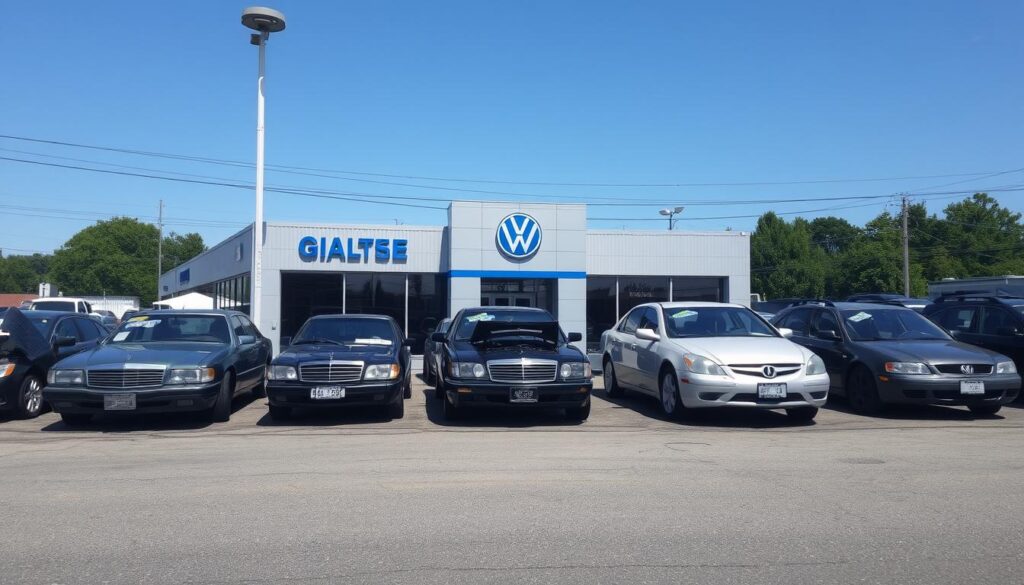
Specialized Dealerships and Salvage Yards
Specialized dealerships that focus on rebuilt vehicles offer another avenue for finding accident cars. These dealerships often have a wide selection of vehicles that have been inspected and repaired. They can provide a more straightforward buying experience compared to direct auction purchases.
Salvage yards are also excellent sources for accident vehicles, particularly those with minor damage that insurance companies deemed uneconomical to repair. You can find hidden gems at salvage yards, but be sure to inspect the vehicles carefully.
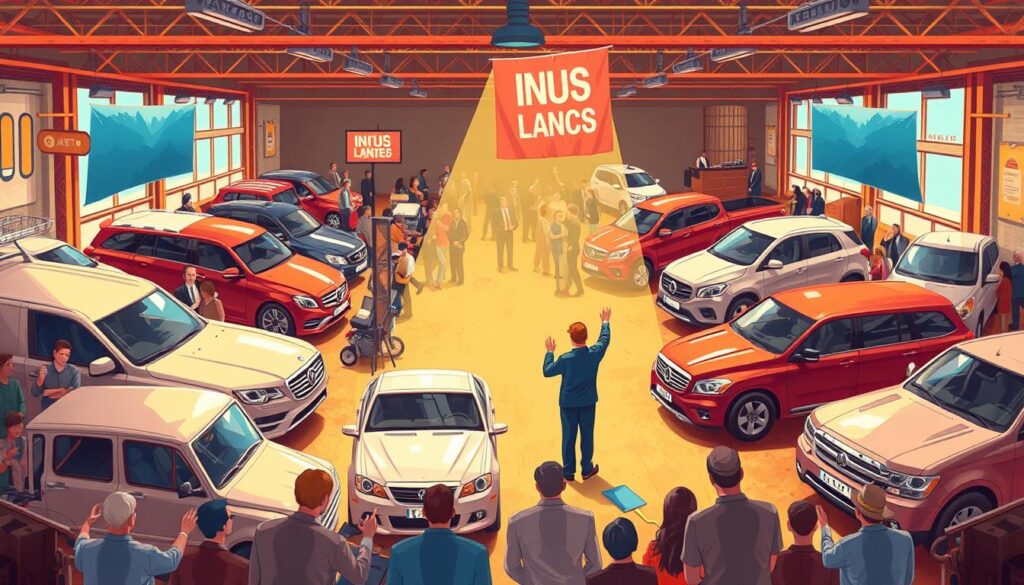
Insurance Auto Auctions (IAA) and Similar Services
Insurance auto auctions, such as IAA, sell vehicles directly from insurance companies. These vehicles are often sold quickly, and the auctions can be a great way to find a good deal. However, it’s essential to research the vehicle’s history and inspect it thoroughly before bidding.
Using advanced search filters on auction sites can help you narrow down your options by location, damage type, and title status. This can save you time and help you find the right vehicle for your needs.
Popular States and Locations for Accident Car Shopping
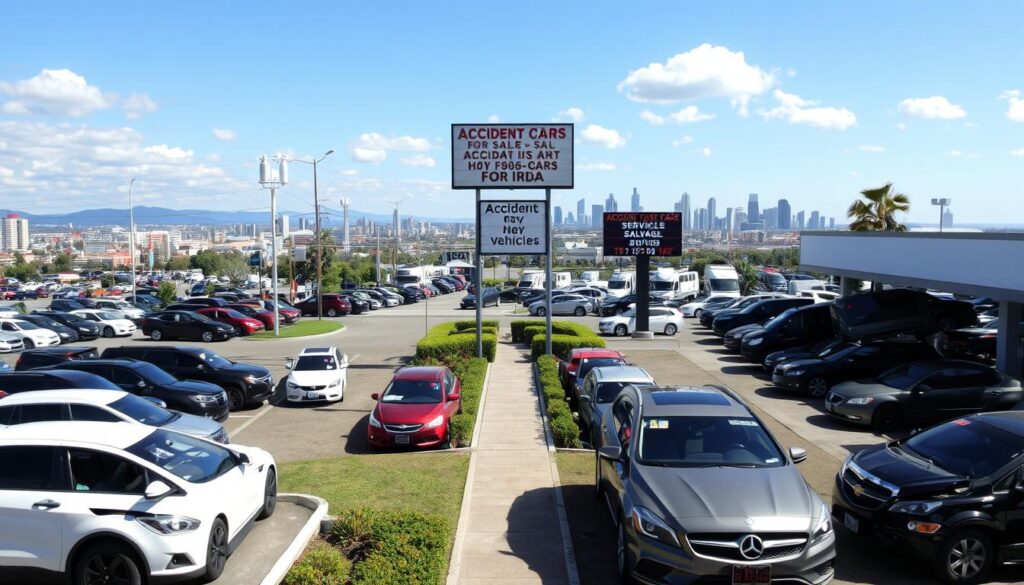
When searching for accident cars for sale in the USA, certain states stand out for their abundance of listings and unique market conditions. The distribution of accident vehicles varies significantly across different regions, influenced by factors such as population density, road conditions, and state regulations.
Major Markets: California, Texas, and Florida are among the top destinations for accident car shoppers. These states lead the nation in accident vehicle availability, with over 44,000 combined listings across major auction platforms. California alone accounts for a significant portion of these listings, with 15,274 vehicles available. Texas follows closely with 19,461 listings, while Florida contributes 9,545. The high volume of listings in these states creates a competitive market with diverse options for buyers.
Major Markets
California, Texas, and Florida dominate the accident car market due to their large populations and high vehicle density. Buyers can find a wide range of models and makes in these states, from economy cars to luxury vehicles. For instance, California’s market includes a variety of luxury brands, while Texas offers a mix of trucks, SUVs, and passenger cars.
East Coast Options
Coastal states like New York, New Jersey, and North Carolina offer unique advantages for accident car shoppers. These regions provide access to luxury models from brands like Aston Martin, Land Rover, and Alfa Romeo. The presence of major ports in these states also affects pricing for international buyers looking to export accident vehicles.
Other Notable Regions
Other states are emerging as significant markets for accident vehicles. New Mexico, for example, is becoming a hub due to its central location and favorable pricing. States like New Hampshire and Rhode Island experience seasonal patterns, with winter accidents creating opportunities for buyers in the spring. Meanwhile, states such as South Dakota, North Dakota, and West Virginia offer less competition at auctions, though with more limited selections.
Understanding these regional dynamics is crucial for making informed purchasing decisions. Factors such as state-specific regulations, transportation costs, and local market conditions all play a role in determining the best location for buying an accident car.
How to Evaluate an Accident Car Before Purchase
The key to a successful accident car purchase lies in a thorough evaluation process. You need to assess the vehicle’s condition, history, and potential for repair to make an informed decision.
Vehicle History Report Analysis
Decoding a vehicle history report is crucial to identify the extent and frequency of damage. This report can reveal patterns that might indicate more serious underlying issues. You should look for any records of accidents, floods, or fires, and check if the vehicle has been previously salvaged or rebuilt.
Verify the title status across multiple databases to ensure there are no hidden liens or title washing issues before placing your bid.
Professional Inspection Essentials
A professional pre-purchase inspection is critical to uncover any hidden damage. You should arrange for an inspection, especially if you’re buying from an auction or a distant location. Consider hiring a mechanic who specializes in the make and model you’re interested in.
For vehicles with reported structural damage, frame measurement and alignment verification are essential, particularly for unibody construction.
Estimating Repair Costs and Feasibility
To accurately estimate repair costs, categorize the damage into structural, mechanical, electrical, and cosmetic components. This will help you prioritize repairs and determine the feasibility of the project.
Consider manufacturer-specific considerations when evaluating accident vehicles, as some makes have more complex repair requirements or expensive proprietary parts.
The Buying Process for Accident Cars
Navigating the process of buying accident cars can be complex, but with the right guidance, you can make informed decisions. The process involves several key steps, from registering for auto auctions to finalizing the delivery of your purchased vehicle.
Registration for Auto Auctions
To start buying accident cars, you need to register with auto auction platforms. This involves providing necessary documentation, making a deposit, and completing the verification process. Different auction platforms may have varying requirements, so it’s crucial to understand these specifics before you begin.
- Review the documentation needed for registration, such as ID and proof of address.
- Understand the deposit amounts required and the payment methods accepted.
- Complete the verification process, which may include background checks or other forms of verification.
Bidding Strategies and Tips
Effective bidding is critical to securing accident vehicles at optimal prices. To bid successfully, you should understand how to time your bids, set appropriate maximum limits, and use proxy bidding systems to your advantage.
Timing your bids correctly can make a significant difference in the outcome. Consider bidding towards the end of the auction to avoid early high bids.
Proxy bidding systems allow you to set a maximum bid, and the system automatically bids on your behalf up to that amount. This helps avoid emotional bidding and ensures you stay within your budget.
- Set a maximum bid based on your budget and the vehicle’s value.
- Use proxy bidding to automate the bidding process.
- Monitor auction dynamics to identify patterns in final sale prices.
Payment, Transportation, and Delivery Options
Once you’ve won a bid, you’ll need to complete the payment, arrange transportation, and finalize the delivery of your vehicle. Understanding the payment timelines, transportation logistics, and delivery options is essential for a smooth transaction.
Major auctions typically accept various secure payment methods. You’ll need to pay a deposit immediately after winning a bid, with the balance due within a specified timeframe.
For transportation, you can either use the auction’s recommended services or arrange your own transport. Consider the costs and logistics of moving the vehicle from the auction location to your destination.
Legal Considerations When Buying Accident Cars
When buying accident cars, understanding the legal landscape is crucial for a smooth transaction. The process involves several legal nuances that can significantly impact your purchase.
Title Status and Transfer Requirements
One of the critical legal considerations is the title status of the accident car. Different title statuses, such as salvage, rebuilt, or branded titles, have distinct implications for registration and insurance. You must understand these differences to navigate the title transfer process successfully. For instance, a salvage title indicates that the vehicle is not roadworthy and may require significant repairs before it can be registered.
Verifying the title status and ensuring it matches the vehicle’s damage history is vital to avoid potential legal issues. You should also be aware of the documentation required for title transfer, which may vary depending on the state and the specific circumstances of the sale.
State-Specific Regulations and Restrictions
State-specific regulations governing accident vehicles can vary significantly. For example, New Mexico may have different inspection requirements compared to other states. Understanding these regulations is essential to ensure that you comply with all necessary legal requirements. You should research the specific laws in your state or the state where you plan to register the vehicle.
Insurance Requirements for Salvage Vehicles
Insurance considerations for salvage and rebuilt vehicles differ from those for vehicles with clean titles. You should be aware of the coverage limitations and potential premium differences. Some states may have specific insurance requirements for salvage vehicles, and understanding these can help you make an informed decision when bidding on an accident car at an auction.
- Understand the implications of different title statuses on registration and insurance.
- Research state-specific regulations and inspection requirements.
- Be aware of insurance coverage limitations for salvage and rebuilt vehicles.
Popular Vehicle Makes and Models in the Accident Car Market
When exploring accident cars for sale, you’ll find various popular brands across different categories. The accident car market is dominated by both domestic and import brands, offering a wide range of options for buyers.
Domestic Brands: Ford, Chevrolet, and Dodge
Domestic brands such as Ford, Chevrolet, and Dodge are highly represented in the accident car market. With over 56,000 combined listings, these brands offer excellent parts availability and repair knowledge. You can find a variety of models from these manufacturers, making it easier to source parts and expertise for repairs. You can bid on accident cars from these brands through various auction sites.
Import Options: Toyota, Honda, and Nissan
Import brands like Toyota, Honda, and Nissan are also extremely popular in the accident car market. Toyota leads all manufacturers with over 25,000 accident vehicles for sale, followed closely by Honda and Nissan. These imports are particularly attractive for rebuilding due to their reliability and popularity. The widespread availability of parts and repair information makes them a favorite among rebuilders.
Luxury and Specialty Vehicles
Luxury and specialty vehicles, including Aston Martin, Land Rover, and Alfa Romeo, offer unique opportunities for buyers. These vehicles are often available at significant discounts from their original prices, making them attractive for those looking for high-end cars at lower costs. However, it’s essential to consider the challenges associated with repairing these vehicles, such as sourcing rare parts and finding specialized repair services.
Understanding the popular makes and models in the accident car market can help you make informed decisions when bidding on vehicles. By considering factors such as parts availability, repair costs, and resale value, you can find great deals on accident cars that meet your needs.
Repairing and Restoring Your Accident Car
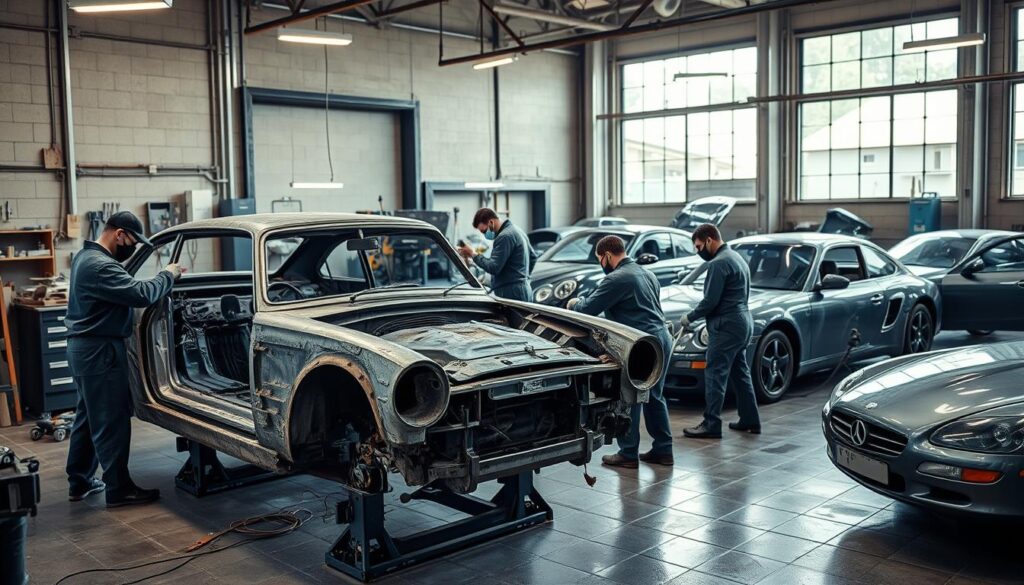
When you purchase an accident car, the next crucial step is deciding how to repair and restore it to a safe and functional condition. This process involves several important decisions and actions that can significantly impact the final outcome and value of your vehicle.
DIY vs. Professional Repair Considerations
One of the first decisions you’ll need to make is whether to undertake the repairs yourself or hire a professional. DIY repairs can be cost-effective for minor cosmetic damage, but they require significant time, skill, and the right tools. On the other hand, professional restoration is often necessary for more extensive damage, particularly when structural integrity is compromised. Professionals have the experience and equipment to ensure that repairs meet safety standards.
Finding Parts and Qualified Mechanics
Sourcing quality replacement parts is crucial for a successful restoration. You can find parts through salvage yards, online marketplaces, and manufacturer channels. It’s equally important to identify qualified mechanics with experience in rebuilding accident vehicles, especially for critical repairs involving safety systems. Different locations, such as New Mexico, New York, and other states like North Carolina and South Dakota, may have specific requirements and resources for finding parts and mechanics.
Inspection and Recertification Process
After repairs are completed, your vehicle will need to undergo an inspection to ensure it meets safety and roadworthiness standards. The recertification process varies by state, with different requirements in places like New Hampshire and Rhode Island. Proper documentation throughout the repair process is essential for maintaining the vehicle’s value and proving the quality of work for future sale or insurance purposes.
Conclusion: Is Buying an Accident Car Right for You?
The accident car market offers opportunities for significant savings, but it’s crucial to approach with caution. As you’ve learned throughout this guide, buying an accident car involves evaluating your personal risk tolerance and mechanical knowledge to ensure it aligns with your capabilities.
Consider your budget constraints and financial goals, weighing the initial savings against potential repair costs and future value implications. Your timeline flexibility is also vital, as accident vehicle purchases and restoration often involve unpredictable delays.
Reflect on your intended use for the vehicle—whether as a daily driver, project car, or investment—and let this guide your purchasing decisions. If you’re ready to start your search today, focus on specific makes and models that match your experience level and have good repair documentation available.
Successful accident car purchases require diligent research, careful inspection, and realistic expectations. Many satisfied buyers have found exceptional value in this market by approaching it with proper preparation and knowledge. Consider creating accounts on major auction platforms and adding promising vehicles to your watchlist today.
